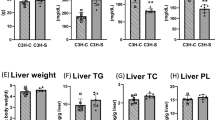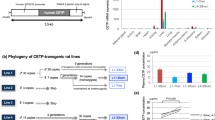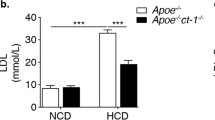Abstract
CHOLESTERYL ester transfer protein (CETP) is a plasma protein that mediates the exchange of neutral lipids among the lipoproteins1–3. Because the principal core lipid of very-low-density lipoprotein (VLDL) is triglyceride and that of high-density lipoprotein (HDL) is cholesterol ester, CETP mediates a 'heteroexchange' of cholesterol ester for triglyceride between those lipoproteins. As a result, animals that express CETP tend to have higher VLDL and low-density lipoprotein (LDL) cholesterol levels, whereas those with no CETP activity tend to have high HDL cholesterol levels2. Because VLDL and LDL are associated with the progression of atherosclerosis, and HDL are considered anti-atherogenic, CETP could be an 'atherogenic' protein, that is, given the other conditions required for atherosclerosis to develop, expression of CETP would accelerate the rate at which the arterial lesions progress. We report here that transgenic mice expressing CETP had much worse atherosclerosis than did non-expressing controls, and we suggest that the increase in lesion severity was due largely to CETP-induced alterations in the lipoprotein profile.
This is a preview of subscription content, access via your institution
Access options
Subscribe to this journal
Receive 51 print issues and online access
$199.00 per year
only $3.90 per issue
Buy this article
- Purchase on Springer Link
- Instant access to full article PDF
Prices may be subject to local taxes which are calculated during checkout
Similar content being viewed by others
References
Zilversmit, D. B. Hughes, L. B. & Balmer, J. Biochim. biophys. Acta 409, 393–398 (1975).
Rye, K. A. & Barter, P. J. Structure and Function of Apolipoproteins (ed. Rosseneu, M.) 401–426 (CRC Press, Boca Raton, 1992).
Tall, A. R. J. Int. Med. 231, 661–668 (1992).
Paigen, B., Morrow, A., Brandon, C., Mitchell, D. & Holmes, P. Atherosclerosis 57, 65–73 (1985).
Paigen, B., Morrow, A., Holmes, P. A., Mitchell, D. & Williams, R. A. Atherosclerosis 68, 231–240 (1987).
Paigen, B. et al. Proc. natn. Acad. Sci. U.S.A. 84, 3763–3767 (1987).
Marotti, K. R. et al. Arterioscler. Thromb. 12, 736–744 (1992).
Paigen, B., Holmes, P. A., Mitchell, D. & Albee, D. Atherosclerosis 64, 215–221 (1987).
Mahley, R. W., Med. Clin. N. Am. 66, 375–402 (1982).
Nishina, P. M., Verstuyft, J. & Paigen, B. J. Lipid Res. 31, 859–869 (1990).
Castle, C. K., Colca, J. R. & Melchior, G. W. Arterioscler. Thromb. 13, 302–309 (1993).
Pape, M. E., Rehberg, E. F., Marotti, K. R. & Melchior, G. W. Arterioscler. Thromb. 11, 1759–1771 (1991).
Author information
Authors and Affiliations
Rights and permissions
About this article
Cite this article
Marotti, K., Castle, C., Boyle, T. et al. Severe atherosclerosis in transgenic mice expressing simian cholesteryl ester transfer protein. Nature 364, 73–75 (1993). https://doi.org/10.1038/364073a0
Received:
Accepted:
Issue Date:
DOI: https://doi.org/10.1038/364073a0
This article is cited by
-
Roles of peripheral lipoproteins and cholesteryl ester transfer protein in the vascular contributions to cognitive impairment and dementia
Molecular Neurodegeneration (2023)
-
Residual risks and evolving atherosclerotic plaques
Molecular and Cellular Biochemistry (2023)
-
HDL as a Treatment Target: Should We Abandon This Idea?
Current Atherosclerosis Reports (2023)
-
Elevated cholesteryl ester transfer and phospholipid transfer proteins aggravated psoriasis in imiquimod-induced mouse models
Lipids in Health and Disease (2022)
-
Hypertriglyceridemia Acute Pancreatitis: Animal Experiment Research
Digestive Diseases and Sciences (2022)
Comments
By submitting a comment you agree to abide by our Terms and Community Guidelines. If you find something abusive or that does not comply with our terms or guidelines please flag it as inappropriate.



